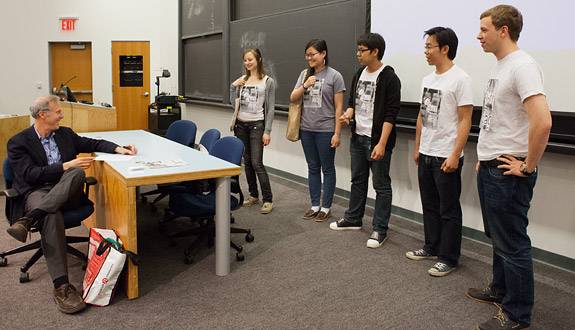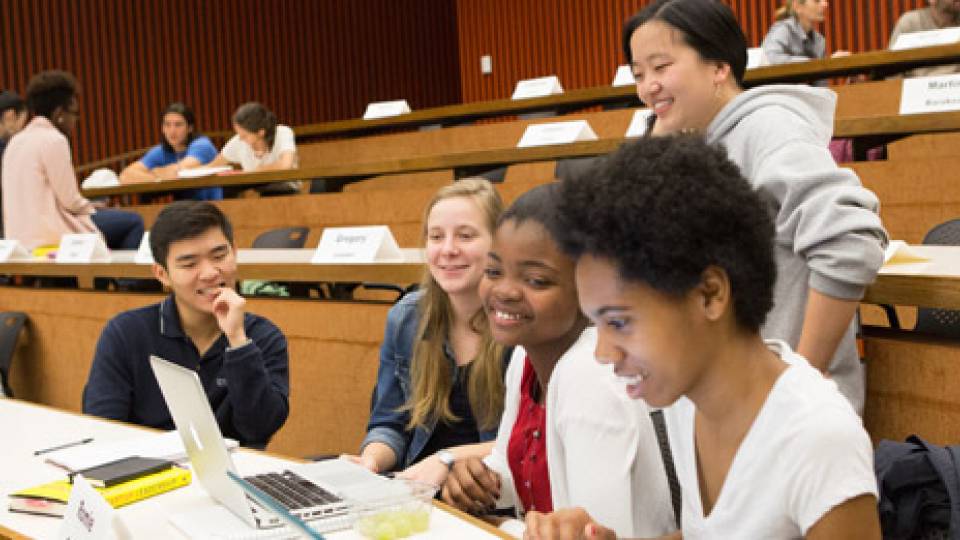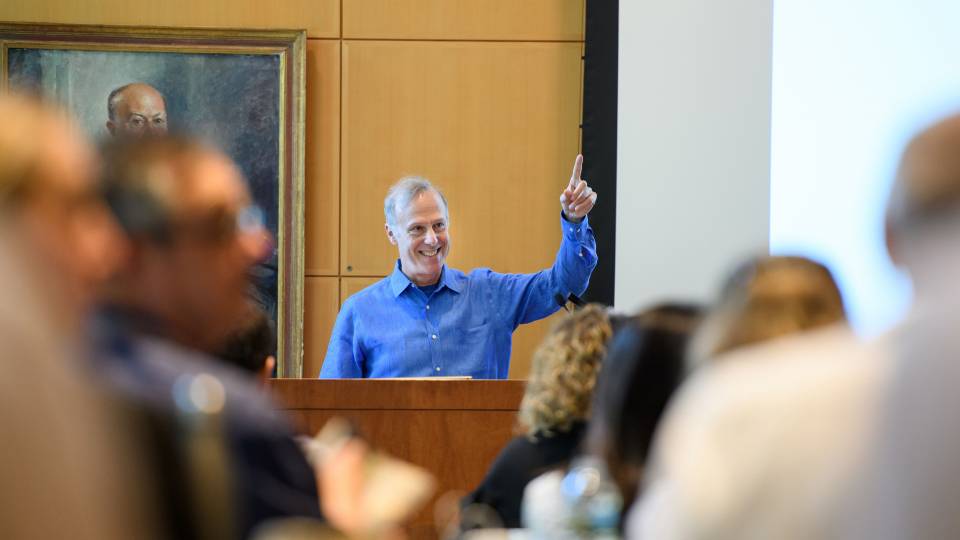It's near the end of the semester, and students in Derek Lidow's class at Princeton University are giving their best pitches on why he should buy their shopping bags.
Some came with slick videos and PowerPoint presentations; others gave live demonstrations of their products' special qualities. One group designed a paper bag for Whole Foods containing a seed insert so customers could plant the whole item in the ground.
Like all the assignments in Lidow's new class called "Entrepreneurial Leadership," this final exercise was designed to give students a taste of the real business world as beginning entrepreneurs. They learn to work in teams to research markets and design a product. They identify manufacturers to produce their product and then put a price on it.

Derek Lidow (left), Princeton's James Wei Visiting Professor of Entrepreneurship, leads a course that uses case studies and hands-on exercises to help students understand and build the leadership skills required to grow a small venture into a mature company. In one of the last assignments, students had to work as a team to design a shopping bag for a company and pitch their idea to Lidow. From left, undergraduates Coraline Griffie, Chenyu Zheng, Alexander Chan, Shu Haur Tang and John Monagle present their concept. (Photo by Denise Applewhite)
Lidow, a 1973 Princeton alumnus and the Keller Center's James Wei Visiting Professor for Entrepreneurship, brings his experience as an entrepreneur and company executive into the classroom. He was the founder, president and CEO of iSuppli Corp., now HIS iSuppli Corp., which provides data analysis for the global electronics industry, and was sold to IHS Inc. in 2010. Prior to that, Lidow was the CEO of International Rectifier Corp., a power semiconductor company.
Lidow and his wife, Diana, are planning to move to Princeton permanently from El Segundo, Calif., after the Keller Center offered him a position as a visiting professor for at least the next three years. "He adds a lot to our entrepreneurial offerings," said Sanjeev Kulkami, the director of the Keller Center. "He has a wonderful way of engaging with students."
The course is envisioned as complementing the popular "High-Tech Entrepreneurship" class, taught by Ed Zschau, a visiting lecturer with the rank of professor in electrical engineering and the Keller Center. While the subject matter of Zschau's course could be compared to childbirth as it pertains to starting a venture, Lidow said, his course is about "early child rearing," and teaches students how to grow a young company.
"That's a more perilous venture for entrepreneurs," he explained. "Less than 10 percent grow the company to the point where it's self-sustaining."
Lidow said he spoke to more than a dozen business colleagues and entrepreneurs and combed through thousands of pages of books to put together his course. "I had to start the course from scratch and maybe because of that I thought outside the box because I didn't realize that there was a box," he recalled.

The course, offered by the Keller Center at the School of Engineering and Applied Science, drew students from across the University. (Photo by Denise Applewhite)
Lidow's students learn how to build and sustain "powerful relationships," and to understand and manage their own strengths and weaknesses. Students work on business school case studies and collaborate in teams on assignments, such as one in which teams compete to construct 60 designs out of sets of interlocking cubes. The course requires students to work in three different teams on 24 assignments as well as read 1,500 pages of cases and books.
Late in the semester, Lidow shocked the class of upperclassmen and graduate students by interrupting the bag assignment for a surprise team assignment to read the 320-page book "Reinventing the Wheel" by Steve Kemper over five days and write an essay about it.
"You could feel the air get sucked out of the room and there were 50 pairs of dagger eyes looking at me," Lidow recalled with a chuckle. But there was a method to his madness: It was aimed at teaching students crisis management. After the initial panic, students organized themselves. Two teams paired up to divide the work among 10 students so each read just 30 pages and then combined their summaries.
A major aim of the course is for students to gain insights into their own leadership abilities. At the end of the semester, students write a final paper on their personal leadership strategy in which they analyze how they will use their strengths and compensate for their weaknesses as business leaders.

Kameron Knab, a senior majoring in economics, presents a shopping bag to Lidow as part of the final course assignment. (Photo by Denise Applewhite)
Tony Xiao, a senior majoring in economics, said the course offers a "methodical" look into the stages of an entrepreneurial business and helped him as he started a software company producing personal content management tools. "It's like having a user manual or a playbook, at the same time you're trying to play the game," he explained.
Senior Leah Cohen-Shohet, an economics major, took the course with her twin sister Danielle, also an economics major, just before they began launching a retail advertising technology startup. "The class taught us that it's not easy but everyone can hone their skills to make some of the processes of working on a team more manageable," she said.
The Cohen-Shohet twins were on a team that turned the boxy bags for yoga clothing maker Lululemon into a cylindrical-shaped bag that could easily hold a yoga mat. They researched their new product by talking to the employees at the Princeton store.
Their goal was to convince Lidow, playing the part of their client, that he should buy their new bag. "This bag is the 2.0 version of your current bag," said team member Ori Daniel, another senior. "In fact, it's created entirely from one of these bags. It's functional and unique and it's in line with your company philosophy."
Xiao noted the exercise was more than developing a good pitch. "It's not the shopping bag itself but it's more like thinking through the mentality and thinking through how different team members work to accomplish this," he said.
And that's one idea that Lidow clearly buys into.

In teaching the course, Lidow draws on his experience founding and growing iSuppi Corp., a company that provides analysis of the global supply chain for the electronics industry and which was sold to IHS Inc. in 2010. (Photo by Denise Applewhite)


